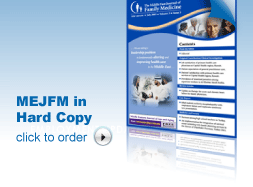|
|
 |
| ............................................................. |
|
|
| ........................................................ |
| From
the Editor |

|
Editorial
A. Abyad (Chief Editor) |
|
|
|
|
........................................................ |
Special
Education feature - Part 2
........................................................
Research
........................................................
Case Report
........................................................
Education Review
|
Middle
East Quality Improvement Program
(MEQUIP QI&CPD)
|
|
Chief
Editor -
Abdulrazak
Abyad
MD, MPH, MBA, AGSF, AFCHSE
.........................................................
Editorial
Office -
Abyad Medical Center & Middle East Longevity
Institute
Azmi Street, Abdo Center,
PO BOX 618
Tripoli, Lebanon
Phone: (961) 6-443684
Fax: (961) 6-443685
Email:
aabyad@cyberia.net.lb
.........................................................
Publisher
-
Lesley
Pocock
medi+WORLD International
11 Colston Avenue,
Sherbrooke 3789
AUSTRALIA
Phone: +61 (3) 9005 9847
Fax: +61 (3) 9012 5857
Email:
lesleypocock@mediworld.com.au
.........................................................
Editorial
Enquiries -
abyad@cyberia.net.lb
.........................................................
Advertising
Enquiries -
lesleypocock@mediworld.com.au
.........................................................
While all
efforts have been made to ensure the accuracy
of the information in this journal, opinions
expressed are those of the authors and do not
necessarily reflect the views of The Publishers,
Editor or the Editorial Board. The publishers,
Editor and Editorial Board cannot be held responsible
for errors or any consequences arising from
the use of information contained in this journal;
or the views and opinions expressed. Publication
of any advertisements does not constitute any
endorsement by the Publishers and Editors of
the product advertised.
The contents
of this journal are copyright. Apart from any
fair dealing for purposes of private study,
research, criticism or review, as permitted
under the Australian Copyright Act, no part
of this program may be reproduced without the
permission of the publisher.
|
|
|
| November 2016
- Volume 14, Issue 9 |
|
|
From
the Editor
..........................................................................................................................
With this issue of the journal we are introducing
the the Middle East Primary Care Quality Improvement
program (MEQUIP). Our time working on the MEJFM
and various regional and global postgraduate
medical education projects and strategies have
seen standards, policies and institutions in
the Middle East and North Africa greatly advance.
However this is not the situation in all regional
countries and there are still issues that affect
all countries of the region.
The needs range from Middle East and North
Africa trained doctors finding difficulty obtaining
employment in many regional and international
organisations, such as Medical schools and hospitals,
lack of ongoing postgraduate education (CME/CPD)
often required by these organisations and a
huge variation in standards and prior education
among practising doctors greatly affecting population
health in a range of countries. The program
will start in Nov 1st 2016. A detail paper on
the topic is included.
A paper from Pakistan looked at the need fro
primary care in Pakistan. The authors stressed
that all over the world, family physicians take
pride in their work of providing care at the
first point of contact; the concept is very
well established and refined in United Kingdom
amongst many other developed countries. General
practitioners in the UK are often known as the
gatekeepers to the National Health Service (NHS).
This is because of family physicians being the
first point of contact for the patients. Majority
of patients are managed in primary care, while
a few who require further treatment are referred
to the secondary care for further management.
It has been known that the access to family
physicians has a positive effect on the overall
health of the patient. In this paper, the author
discussed the disease burden, with brief introduction
to the current healthcare provision and conclude
with suggestions for implementation of family
medicine as a speciality in rescuing the ailing
healthcare delivery system of Pakistan.
A paper from the UAE discussed a national model
for CME/CPD program for dentistry within primary
care. The paper is part of an extensive survey
done at the Emirate of Abu Dhabi. Recommendations
and conclusions were presented by the author.
A case report from Libya presented a case of
Acute hair matting (AHM) which is a rare acquired
encountered condition in the medical setting,
rarely seen, presenting as an acute sudden solid
mass of irreversible matting of scalp hair on
the vertex in otherwise healthy individuals
due to vigorous shampooing or neglect of hair
or parasitic infestations. Subsequently, other
factors such as shampoos including herbs, conditioners
are claimed to be the culprit as well. It's
also called as Plica neuropathica. The condition
is with irregular hair twists that severely
entangled hairs abruptly formed in the scalp.
In this case A 16-year-old otherwise healthy,
single Libyan girl from the outskirt of Libya
presented with a foul-smelling boggy mass of
hair on scalp since few months, which she could
not be combed for five days. The patient, who
wears a head covering for religious reasons
had a distinctive big head due to hair matting,
and had not shampooed her hair in 6 days. She
indicated that routinely washed her hair once
weekly. Physical and laboratory evolution were
done. Review of the condition was presented
by the author.
A joint paper from Libya and Australia describes
workforce characteristics of the only functioning
disability rehabilitation service in 2012 Libya.
This was the Benghazi Rehabilitation and Handicap
Center. The focus of the case study was the
physical disability services including amputee
care. The
study provides an insight into issues affecting
disability services and revealed areas for future
post-conflict workforce development and opportunities
for disability service capacity building particularly
in relation to coordinated information systems,
qualification upgrades, in-service training,
and development of inpatient discharge options
including community based rehabilitation and
supported accommodation.
.........................................................................................................................
|
|
.................................................................................................................

|
| |
|

